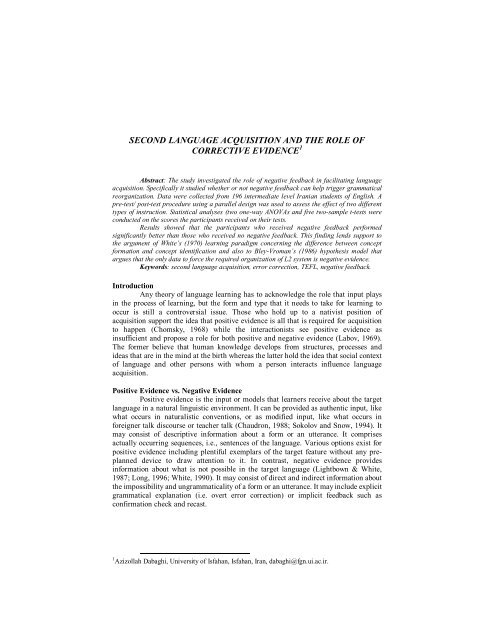language and literature european landmarks of identity
language and literature european landmarks of identity
language and literature european landmarks of identity
Create successful ePaper yourself
Turn your PDF publications into a flip-book with our unique Google optimized e-Paper software.
SECOND LANGUAGE ACQUISITION AND THE ROLE OF<br />
CORRECTIVE EVIDENCE 1<br />
Abstract: The study investigated the role <strong>of</strong> negative feedback in facilitating <strong>language</strong><br />
acquisition. Specifically it studied whether or not negative feedback can help trigger grammatical<br />
reorganization. Data were collected from 196 intermediate level Iranian students <strong>of</strong> English. A<br />
pre-test/ post-test procedure using a parallel design was used to assess the effect <strong>of</strong> two different<br />
types <strong>of</strong> instruction. Statistical analyses (two one-way ANOVAs <strong>and</strong> five two-sample t-tests were<br />
conducted on the scores the participants received on their tests.<br />
Results showed that the participants who received negative feedback performed<br />
significantly better than those who received no negative feedback. This finding lends support to<br />
the argument <strong>of</strong> White’s (1970) learning paradigm concerning the difference between concept<br />
formation <strong>and</strong> concept identification <strong>and</strong> also to Bley-Vroman’s (1986) hypothesis model that<br />
argues that the only data to force the required organization <strong>of</strong> L2 system is negative evidence.<br />
Keywords: second <strong>language</strong> acquisition, error correction, TEFL, negative feedback.<br />
Introduction<br />
Any theory <strong>of</strong> <strong>language</strong> learning has to acknowledge the role that input plays<br />
in the process <strong>of</strong> learning, but the form <strong>and</strong> type that it needs to take for learning to<br />
occur is still a controversial issue. Those who hold up to a nativist position <strong>of</strong><br />
acquisition support the idea that positive evidence is all that is required for acquisition<br />
to happen (Chomsky, 1968) while the interactionists see positive evidence as<br />
insufficient <strong>and</strong> propose a role for both positive <strong>and</strong> negative evidence (Labov, 1969).<br />
The former believe that human knowledge develops from structures, processes <strong>and</strong><br />
ideas that are in the mind at the birth whereas the latter hold the idea that social context<br />
<strong>of</strong> <strong>language</strong> <strong>and</strong> other persons with whom a person interacts influence <strong>language</strong><br />
acquisition.<br />
Positive Evidence vs. Negative Evidence<br />
Positive evidence is the input or models that learners receive about the target<br />
<strong>language</strong> in a natural linguistic environment. It can be provided as authentic input, like<br />
what occurs in naturalistic conventions, or as modified input, like what occurs in<br />
foreigner talk discourse or teacher talk (Chaudron, 1988; Sokolov <strong>and</strong> Snow, 1994). It<br />
may consist <strong>of</strong> descriptive information about a form or an utterance. It comprises<br />
actually occurring sequences, i.e., sentences <strong>of</strong> the <strong>language</strong>. Various options exist for<br />
positive evidence including plentiful exemplars <strong>of</strong> the target feature without any preplanned<br />
device to draw attention to it. In contrast, negative evidence provides<br />
information about what is not possible in the target <strong>language</strong> (Lightbown & White,<br />
1987; Long, 1996; White, 1990). It may consist <strong>of</strong> direct <strong>and</strong> indirect information about<br />
the impossibility <strong>and</strong> ungrammaticality <strong>of</strong> a form or an utterance. It may include explicit<br />
grammatical explanation (i.e. overt error correction) or implicit feedback such as<br />
confirmation check <strong>and</strong> recast.<br />
1 Azizollah Dabaghi, University <strong>of</strong> Isfahan, Isfahan, Iran, dabaghi@fgn.ui.ac.ir.


